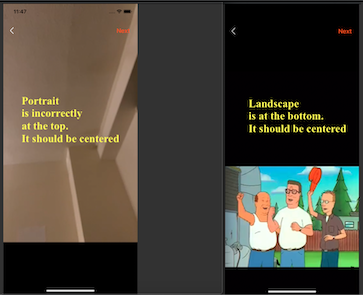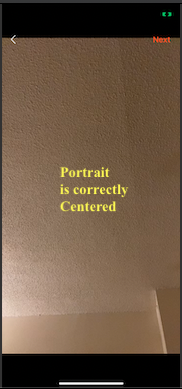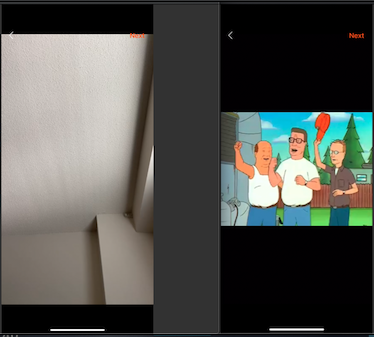合并视频时迅速的-AVMutableVideoCompositionLayerInstruction不对齐
我跟踪雷·温德里希来合并视频。最终的结果是一个合并视频,其中肖像视频在屏幕顶部,景观视频在屏幕底部。在下面的图像中,先播放肖像视频,然后播放风景视频。风景录像是从照片图书馆。

代码:
func mergVideos() {
let mixComposition = AVMutableComposition()
let videoCompositionTrack = mixComposition.addMutableTrack(withMediaType: .video, preferredTrackID: Int32(kCMPersistentTrackID_Invalid))
let audioCompositionTrack = mixComposition.addMutableTrack(withMediaType: .audio, preferredTrackID: Int32(kCMPersistentTrackID_Invalid))
var count = 0
var insertTime = CMTime.zero
var instructions = [AVMutableVideoCompositionInstruction]()
for videoAsset in arrOfAssets {
let audioTrack = videoAsset.tracks(withMediaType: .audio)[0]
do {
try videoCompositionTrack?.insertTimeRange(CMTimeRangeMake(start: .zero, duration: videoAsset.duration), of: videoAsset.tracks(withMediaType: .video)[0], at: insertTime)
try audioCompositionTrack?.insertTimeRange(CMTimeRangeMake(start: .zero, duration: videoAsset.duration), of: audioTrack, at: insertTime)
let layerInstruction = videoCompositionInstruction(videoCompositionTrack!, asset: videoAsset, count: count)
let videoCompositionInstruction = AVMutableVideoCompositionInstruction()
videoCompositionInstruction.timeRange = CMTimeRangeMake(start: insertTime, duration: videoAsset.duration)
videoCompositionInstruction.layerInstructions = [layerInstruction]
instructions.append(videoCompositionInstruction)
insertTime = CMTimeAdd(insertTime, videoAsset.duration)
count += 1
} catch { }
}
let videoComposition = AVMutableVideoComposition()
videoComposition.instructions = instructions
videoComposition.frameDuration = CMTimeMake(value: 1, timescale: 30)
videoComposition.renderSize = CGSize(width: UIScreen.main.bounds.width, height: UIScreen.main.bounds.height)
// ...
exporter.videoComposition = videoComposition
}Ray Wenderlich代码:
func videoCompositionInstruction(_ track: AVCompositionTrack, asset: AVAsset, count: Int) -> AVMutableVideoCompositionLayerInstruction {
let instruction = AVMutableVideoCompositionLayerInstruction(assetTrack: track)
let assetTrack = asset.tracks(withMediaType: .video)[0]
let transform = assetTrack.preferredTransform
let assetInfo = orientationFromTransform(transform)
var scaleToFitRatio = UIScreen.main.bounds.width / assetTrack.naturalSize.width
if assetInfo.isPortrait {
scaleToFitRatio = UIScreen.main.bounds.width / assetTrack.naturalSize.height
let scaleFactor = CGAffineTransform(scaleX: scaleToFitRatio, y: scaleToFitRatio)
instruction.setTransform(assetTrack.preferredTransform.concatenating(scaleFactor), at: .zero)
} else {
let scaleFactor = CGAffineTransform(scaleX: scaleToFitRatio, y: scaleToFitRatio)
var concat = assetTrack.preferredTransform.concatenating(scaleFactor)
.concatenating(CGAffineTransform(translationX: 0,y: UIScreen.main.bounds.width / 2))
if assetInfo.orientation == .down {
let fixUpsideDown = CGAffineTransform(rotationAngle: CGFloat(Double.pi))
let windowBounds = UIScreen.main.bounds
let yFix = assetTrack.naturalSize.height + windowBounds.height
let centerFix = CGAffineTransform(translationX: assetTrack.naturalSize.width, y: yFix)
concat = fixUpsideDown.concatenating(centerFix).concatenating(scaleFactor)
}
instruction.setTransform(concat, at: .zero)
}
if count == 0 {
instruction.setOpacity(0.0, at: asset.duration)
}
return instruction
}
func orientationFromTransform(_ transform: CGAffineTransform) -> (orientation: UIImage.Orientation, isPortrait: Bool) {
var assetOrientation = UIImage.Orientation.up
var isPortrait = false
let tfA = transform.a
let tfB = transform.b
let tfC = transform.c
let tfD = transform.d
if tfA == 0 && tfB == 1.0 && tfC == -1.0 && tfD == 0 {
assetOrientation = .right
isPortrait = true
} else if tfA == 0 && tfB == -1.0 && tfC == 1.0 && tfD == 0 {
assetOrientation = .left
isPortrait = true
} else if tfA == 1.0 && tfB == 0 && tfC == 0 && tfD == 1.0 {
assetOrientation = .up
} else if tfA == -1.0 && tfB == 0 && tfC == 0 && tfD == -1.0 {
assetOrientation = .down
}
return (assetOrientation, isPortrait)
}我还遵循了这个介质帖子的代码。它将呈现大小设置为默认的let renderSize = CGSize(width: 1280.0, height: 720.0),而不是使用整个屏幕的Ray。
在1280/720的结果是,肖像视频是正确的,但与景观视频,声音播放,但视频没有在屏幕上。我没有添加风景图片,因为它只是一个黑色的屏幕。

回答 1
Stack Overflow用户
发布于 2022-03-13 14:50:44
我让它同时适用于肖像和风景。

我测试了这个答案与录像记录在肖像,景观左右,倒置,前相机,和后面的相机。我没出过任何问题。我不是CGAffineTransform专家,所以如果有人有更好的答案,请发出来。
Ray的合并代码可以工作,但是它不适用于不同方向的视频。我使用这个回答来检查preferredTransform的属性,用于orientation检查。
我还为portrait orientation部件使用了一个portrait orientation答案,对于landscape orientation部件使用了一个被否决答案。被否决的答案把我带到了他的GitHub,那里的景观代码是,不正确的,但足够接近,我可以调整它,使它正常工作。
需要指出的一点是,@DonMag的评论告诉我使用720x1280的好处。下面的代码将将所有视频与renderSize of 720x1280合并,这将使它们保持相同的大小。
代码:
// class property
let renderSize = CGSize(width: 720, height: 1280) // for higher quality use CGSize(width: 1080, height: 1920)
func mergVideos() {
let mixComposition = AVMutableComposition()
let videoCompositionTrack = mixComposition.addMutableTrack(withMediaType: .video, preferredTrackID: Int32(kCMPersistentTrackID_Invalid))
let audioCompositionTrack = mixComposition.addMutableTrack(withMediaType: .audio, preferredTrackID: Int32(kCMPersistentTrackID_Invalid))
var count = 0
var insertTime = CMTime.zero
var instructions = [AVMutableVideoCompositionInstruction]()
for videoAsset in arrOfAssets {
guard let firstTrack = videoAsset.tracks.first, let _ = videoAsset.tracks(withMediaType: .video).first else { continue }
do {
try videoCompositionTrack?.insertTimeRange(CMTimeRangeMake(start: .zero, duration: videoAsset.duration), of: videoAsset.tracks(withMediaType: .video)[0], at: insertTime)
if let audioTrack = videoAsset.tracks(withMediaType: .audio).first {
try audioCompositionTrack?.insertTimeRange(CMTimeRangeMake(start: .zero, duration: videoAsset.duration), of: audioTrack, at: insertTime)
}
let layerInstruction = videoCompositionInstruction(firstTrack, asset: videoAsset, count: count)
let videoCompositionInstruction = AVMutableVideoCompositionInstruction()
videoCompositionInstruction.timeRange = CMTimeRangeMake(start: insertTime, duration: videoAsset.duration)
videoCompositionInstruction.layerInstructions = [layerInstruction]
instructions.append(videoCompositionInstruction)
insertTime = CMTimeAdd(insertTime, videoAsset.duration)
count += 1
} catch { }
}
let videoComposition = AVMutableVideoComposition()
videoComposition.instructions = instructions
videoComposition.frameDuration = CMTimeMake(value: 1, timescale: 30)
videoComposition.renderSize = self.renderSize // <--- **** IMPORTANT ****
// ...
exporter.videoComposition = videoComposition
}这个答案的大多数重要部分()都取代了RW代码:
func videoCompositionInstruction(_ firstTrack: AVAssetTrack, asset: AVAsset, count: Int) -> AVMutableVideoCompositionLayerInstruction {
let instruction = AVMutableVideoCompositionLayerInstruction(assetTrack: firstTrack)
let assetTrack = asset.tracks(withMediaType: .video)[0]
let t = assetTrack.fixedPreferredTransform // new transform fix
let assetInfo = orientationFromTransform(t)
if assetInfo.isPortrait {
let scaleToFitRatio = self.renderSize.width / assetTrack.naturalSize.height
let scaleFactor = CGAffineTransform(scaleX: scaleToFitRatio, y: scaleToFitRatio)
var finalTransform = assetTrack.fixedPreferredTransform.concatenating(scaleFactor)
// This was needed in the case of the OP's answer that I used for the portrait part. I haven't tested this but this is what he said: "(if video not taking entire screen and leaving some parts black - don't know when actually needed so you'll have to try and see when it's needed)"
if assetInfo.orientation == .rightMirrored || assetInfo.orientation == .leftMirrored {
finalTransform = finalTransform.translatedBy(x: -transform.ty, y: 0)
}
instruction.setTransform(finalTransform, at: CMTime.zero)
} else {
let renderRect = CGRect(x: 0, y: 0, width: self.renderSize.width, height: self.renderSize.height)
let videoRect = CGRect(origin: .zero, size: assetTrack.naturalSize).applying(assetTrack.fixedPreferredTransform)
let scale = renderRect.width / videoRect.width
let transform = CGAffineTransform(scaleX: renderRect.width / videoRect.width, y: (videoRect.height * scale) / assetTrack.naturalSize.height)
let translate = CGAffineTransform(translationX: .zero, y: ((self.renderSize.height - (videoRect.height * scale))) / 2)
instruction.setTransform(assetTrack.fixedPreferredTransform.concatenating(transform).concatenating(translate), at: .zero)
}
if count == 0 {
instruction.setOpacity(0.0, at: asset.duration)
}
return instruction
}新的定向检查:
func orientationFromTransform(_ transform: CGAffineTransform) -> (orientation: UIImage.Orientation, isPortrait: Bool) {
var assetOrientation = UIImage.Orientation.up
var isPortrait = false
if transform.a == 0 && transform.b == 1.0 && transform.c == -1.0 && transform.d == 0 {
assetOrientation = .right
isPortrait = true
} else if transform.a == 0 && transform.b == 1.0 && transform.c == 1.0 && transform.d == 0 {
assetOrientation = .rightMirrored
isPortrait = true
} else if transform.a == 0 && transform.b == -1.0 && transform.c == 1.0 && transform.d == 0 {
assetOrientation = .left
isPortrait = true
} else if transform.a == 0 && transform.b == -1.0 && transform.c == -1.0 && transform.d == 0 {
assetOrientation = .leftMirrored
isPortrait = true
} else if transform.a == 1.0 && transform.b == 0 && transform.c == 0 && transform.d == 1.0 {
assetOrientation = .up
} else if transform.a == -1.0 && transform.b == 0 && transform.c == 0 && transform.d == -1.0 {
assetOrientation = .down
}
}preferredTransform 修复
extension AVAssetTrack {
var fixedPreferredTransform: CGAffineTransform {
var t = preferredTransform
switch(t.a, t.b, t.c, t.d) {
case (1, 0, 0, 1):
t.tx = 0
t.ty = 0
case (1, 0, 0, -1):
t.tx = 0
t.ty = naturalSize.height
case (-1, 0, 0, 1):
t.tx = naturalSize.width
t.ty = 0
case (-1, 0, 0, -1):
t.tx = naturalSize.width
t.ty = naturalSize.height
case (0, -1, 1, 0):
t.tx = 0
t.ty = naturalSize.width
case (0, 1, -1, 0):
t.tx = naturalSize.height
t.ty = 0
case (0, 1, 1, 0):
t.tx = 0
t.ty = 0
case (0, -1, -1, 0):
t.tx = naturalSize.height
t.ty = naturalSize.width
default:
break
}
return t
}
}https://stackoverflow.com/questions/71447131
复制相似问题

